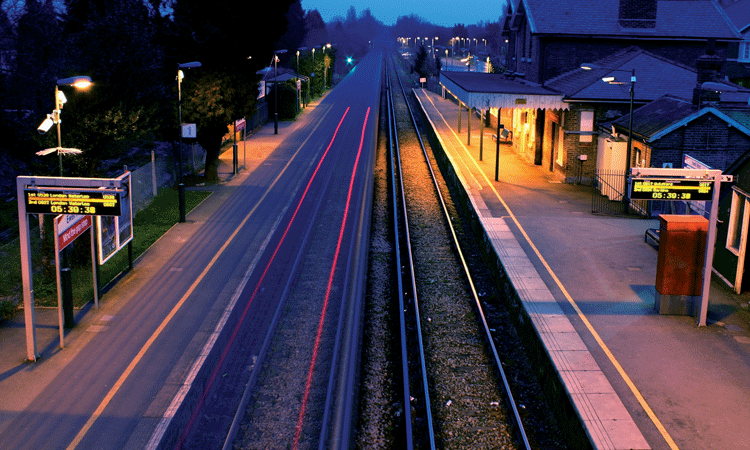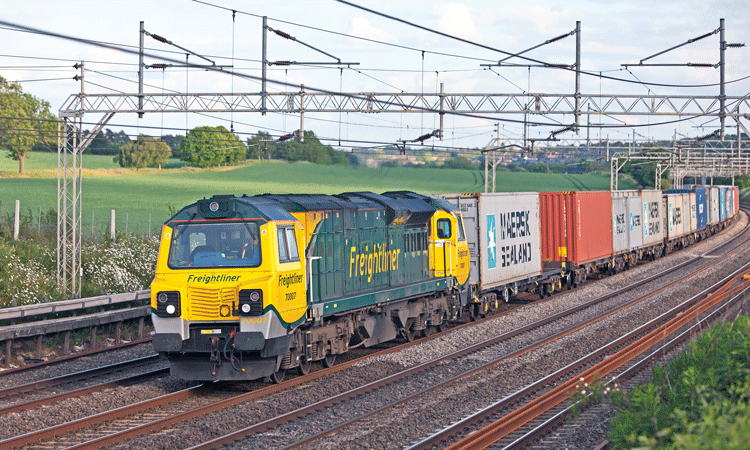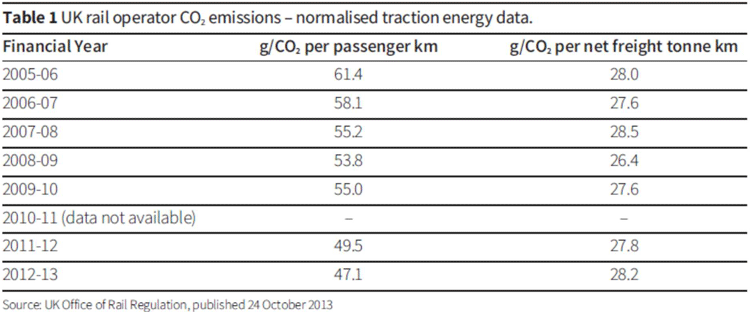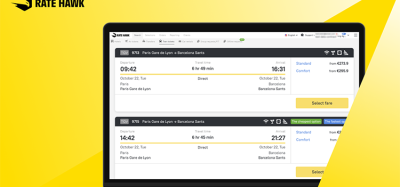Progress and challenges of rail sustainability in the UK
Posted: 3 March 2014 | | No comments yet
The railway is a positive force for good and essential to economic, social, and environmental development. In the UK, the rail sector has delivered unprecedented growth in recent years, responding successfully to changing economic geography and new consumer demands. Rail has linked people to jobs, connected families and friends, and shifted cars and trucks off the road and is working hard to improve its already strong environmental performance. Alex Veitch, European Affairs and Sustainability Manager at the Rail Delivery Group explains more.


On the economic aspects, the railway is boosting the UK’s economic competitiveness by providing more services and better connections between our major economic centres and a cost-effective alternative to road haulage. Compared to the mid-1990s, there is 40% more freight and are now 4,000 more passenger services a day. Frequencies on many mainline routes have been doubled, with most large cities now connected by intercity train services running at least every 30 minutes and some every 20 minutes.
Social aspects
On social aspects, the rail industry recognises its responsibilities as the provider of an essential public transport service, helping to sustain family and social ties during periods of economic change. From providing discounted advance tickets and offering Railcards with significant savings, through to investments in stations and trains to make them more accessible, the industry is working together to ensure the railway is open to all.
A good example of the UK rail sector’s commitment is the new Two Together Railcard1. This is the first national UK Railcard to be launched in 30 years and gives two named adults 1/3 off Standard and First Class Anytime, Off-Peak and Advance fares on train services throughout Great Britain, when they travel together after 09:30 Monday to Friday, and any time at weekends and on Public Holidays.


Compared to the mid-1990s, there is 40% more rail freight on the UK network
Another important social issue is engagement with local communities. The UK rail sector has developed an interesting approach to this, known as Community Rail Partnerships (CRPs). The CRPs are a bridge between the railway and local communities. They are about positive development, bringing together a wide range of interests along the rail corridor. Some partnerships have been instrumental in achieving spectacular increases in use of rail through innovative marketing, improved services and better station facilities.
The work of CRPs include improving bus links to stations, developing walking and cycling routes, bringing station buildings back to life, art and education projects and organising special events which promote the railway and its relevance to the community.
A dedicated organisation, the Association of Community Rail Partnerships2 (ACORP), provides guidance and support to a federation of over 50 CRPs and other rail promotion groups. ACORP works with decision-makers at a local, regional and national level to ensure that local rail’s important role is fully recognised; helps identify innovative solutions for local railways; disseminates examples of good practice; and works with local stakeholders to develop new partnerships.
Other key societal issues facing the UK railway are around talent recruitment and retention; in particular the challenge of attracting younger people into the sector. The UK railway infrastructure manager, Network Rail, is providing leadership through the operation of an award-winning apprentice scheme. Since 2005, Network Rail has trained 1,050 apprentices across Britain through the three-year scheme with a further 600 currently still in training. Applications are open to anyone over 17 years of age by 31 August 2014.
Another critical initiative is the National Skills Academy Railway Engineering3 (NSARE) which was established to help tackle current and future skills needed within the railway engineering sector. The sector’s vision is that by 2015, its engineering workforce will have the necessary skills to support the maintenance, development and expansion of a first-class, cost effective 21st Century railway.
The NSARE is part of the UK National Skills Academy (NSA) network, which is a unique structure of employer-led centres of excellence for skills training. NSAs operate as hubs of expert resource and knowledge and lead specialist networks of colleges and training providers. They match employers to provision and work with providers to develop their capacity, capability and standards in order to meet the needs of those of their sector.
Environmental factors
Rail is a low carbon and low-pollution mode of transport. By attracting record numbers of passengers away from their cars and domestic air travel and freight customers away from road hauliers, the railway is helping to reduce transport carbon emissions. The UK rail sector industry is working hard to reduce its own carbon footprint. Measures taken include further electrification, more energy-efficient driving, and technology to reduce energy consumption when trains are not in use. The UK rail sector is also developing an adaptation strategy to prepare for future climate conditions.
Looking in more detail at energy and CO2 management gives an insight into how the sector is tackling environmental issues more generally. For railway buildings (i.e. non-traction energy) UK railway organisations are included in the CRC Energy Efficiency Scheme which requires all large companies to monitor their energy use, and report their energy supplies annually to the scheme administrator, the UK Environment Agency (EA).
The EA reporting system applies emissions factors to calculate participants’ CO2 emissions, and participants must purchase and surrender allowances to offset their emissions. Allowances can either be bought at annual fixed-price sales, or traded on the secondary market.
For traction energy, UK rail operators report their energy usage annually to the national UK rail regulator, the ORR. The ORR then calculates CO2 emissions using government conversion factors, and publishes the results on its website. A summary of UK rail transport CO2 emissions from traction energy consumption is shown in Table 1. This clearly demonstrates that the rail sector has improved its CO2 emissions performance substantially.


Going forward, the UK government is planning to introduce a new requirement on all large private sector organisations, including rail operators, to conduct an Energy Assessment at least every four years, including both traction and non-traction energy. Known as the Energy Savings Opportunity Scheme, this new measure will fulfil a requirement of the EU Energy Efficiency Directive as transposed into UK law.
In addition to these legal requirements, passenger operators working under contract to the UK Department for Transport and the Welsh and Scottish Governments (known as ‘franchised’ operators in the UK) will have to demonstrate how they manage environmental and energy issues, including in some cases reporting against Key Performance Indicators stipulated by the contracting authority. Although energy and CO2 is the focus of this article, the environmental requirements also include waste, water management and other factors.
The final driver of action worth noting is voluntary best-practice. All franchised operators have environmental policies published on their website and either have, or are working towards, ISO 14001 accreditation. Although energy management is the main subject of this article, operators closely manage all environmental impacts, including waste and pollution, environmental noise and other issues.
Strategies – pulling it together
Each of the leading organisations in the UK rail sector has developed their own sustainability strategy. Network Rail has recently published a new sustainability strategy4 which looks at the environmental, social and economic issues of all NR assets and operations. Similarly, the corporate owning groups of train operating companies produce sustainability reports and strategies5 which focus on their operational impacts and responsibilities.
Pulling this together into a combined sector strategy is the Sustainable Rail Programme, coordinated by the UK Rail Safety Standards Board (RSSB), which includes operators and Network Rail, plus supply chain representatives and other stakeholders. This programme has developed a set of sustainability challenges, ambitions and progress reports for the sector3.
Conclusion: where next?
As this article has demonstrated, there is a huge amount of activity underway to improve the social and environmental performance of UK railways, and to demonstrate its contribution to the broader economy. Going forward there will be some important challenges to overcome. For example, the increased electrification in the UK is a major improvement for operational and environmental performance, but also exposes railways to increase price volatility due to the major restructure of the UK energy market currently underway. On social issues, there is a constant challenge to meet the expectations of society, stakeholders and staff, while ensuring competitiveness and business performance. Nevertheless, working together, the UK sector is prepared to meet and overcome these challenges.
References
- twotogether-railcard.co.uk
- acorp.uk.com
- nsare.org
- The short version can be found online here: http://www.networkrail.co.uk/browse%20documents/strategicbusinessplan/cp5/supporting%20documents/transforming%20network%20rail/sustainable%20development%20strategy.pdf
- For example, First Group: http://www.firstgroup.com/corporate/cr and Go Ahead: http://www.go-ahead.com/sustainability/reports
- Information on the Sustainable Rail Programme is available here: http://www.rssb.co.uk/NP/SRP/Pages/default.aspx








